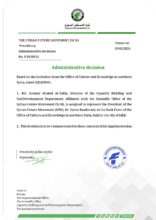Divorce and Its Impact on Child Rearing

Divorce is known as the legal termination of a marital relationship, leading to the separation of the spouses and each living an independent life. Although divorce may be a difficult decision, it can sometimes be the most suitable solution. Here, however, we are not studying the evaluation of divorce, its justifications, or its causes; rather, the Syrian Future Movement’s Family Affairs Office aims to shed light on the reality of child rearing and the impact of divorce on it.
The Impact of Divorce on Children:
Divorce is a significant event in children’s lives and can leave long-term psychological and social effects. Children often link family stability to their happiness and security, and when their parents separate, they may experience fear, anxiety, and instability.
Key Negative Effects of Divorce on Children:
- Sadness and Depression: Children often feel profound sadness over the loss of a cohesive family and may feel isolated.
- Anger and Aggression: Children’s sadness can sometimes turn into anger and aggression, directed either toward themselves or others.
- Feelings of Guilt: Some children may believe they are responsible for their parents’ divorce, increasing their emotional suffering.
- Learning Difficulties: Children may face concentration and learning challenges due to the stress and anxiety caused by divorce.
- Social Relationship Issues: Due to low self-confidence and loneliness, children may find it difficult to build healthy social relationships.
- Some children may exhibit problematic behaviors such as aggression, defiance, and introversion.
- Impact on Physical Health: Issues like headaches and stomachaches may arise due to stress and anxiety.
Factors Influencing the Severity of Divorce’s Impact on Children:
- Child’s Age: Younger children may have a harder time understanding the meaning of divorce and its effects on them.
- Child’s Personality: Responses to divorce vary depending on each child’s personality and their adaptability.
- Parents’ Approach: Parents can alleviate the impact of divorce by communicating openly and honestly with their children and offering emotional support.
- Social Support: Supportive family and friends can help children cope with the challenges of divorce.
Overcoming the Effects of Divorce:
Overcoming the effects of divorce on children requires a collaborative effort from both parents, close cooperation between them, a supportive environment for the children, and some recommended strategies that can help reduce the impact of divorce on children:
For Parents:
- Open and Honest Communication: Talk to children about the divorce in a clear and age-appropriate way, explaining the reasons behind it.
- Maintaining a Stable Routine: Keep a consistent daily routine as much as possible, including sleep and mealtimes, to help children feel safe and secure.
- Avoiding Conflict in Front of Children: Refrain from involving children in disputes or arguments in their presence.
- Providing Emotional Support: Give children time to express their feelings, listen attentively, and show love and care.
- Joint Cooperation in Parenting: Focus on the well-being of the children as a priority, avoiding any competition between divorced parents.
- Seeking Professional Support: If children experience psychological challenges, consider consulting specialized support.
- Offering Financial and Emotional Support: Ensure that children receive the necessary support in all aspects of their lives.
It is important to note that every child is affected by divorce differently; there is no one-size-fits-all approach. Children also need time to adjust to the changes in their lives, so parents must continue to provide support as children navigate this challenging phase.
Positive Aspects of Divorce for Children:
The possibility of divorce being beneficial for children is complex, and the answer is not straightforward. Generally, divorce is not considered a positive experience for children, as it is often associated with negative emotions such as sadness, fear, and anger. It may also impact the child’s emotional and behavioral development.
But could there be exceptions?
In some rare cases, divorce may be the best option for children, especially if the family environment is filled with continuous conflict and violence. In such cases, divorce might serve as a way to end the suffering of children and protect them from psychological and physical harm.
Although divorce can be a painful experience for children, its negative effects can be managed by providing a safe and supportive environment, offering necessary emotional support, and turning the ordeal into an opportunity. The stories of creative figures in human history are full of hardships that strengthened children early on, shaping their personalities more robustly than others.
Conclusion
Parental divorce is one of the most challenging events children can experience. Nevertheless, parents can take steps to reduce the negative impact of divorce on their children, as we have outlined.
We emphasize the importance of having both parents involved and maintaining a positive relationship with each parent, even if they do not live together. While divorce is a painful experience for children, its negative effects can be minimized by providing a safe and supportive environment and offering essential emotional support. It is essential to remember that the welfare of the children is paramount, and cooperation between parents is key to success.
Family Affairs Office
Waheba Al-Masri
Research and Studies Department
Articles
Syrian Future Movement






